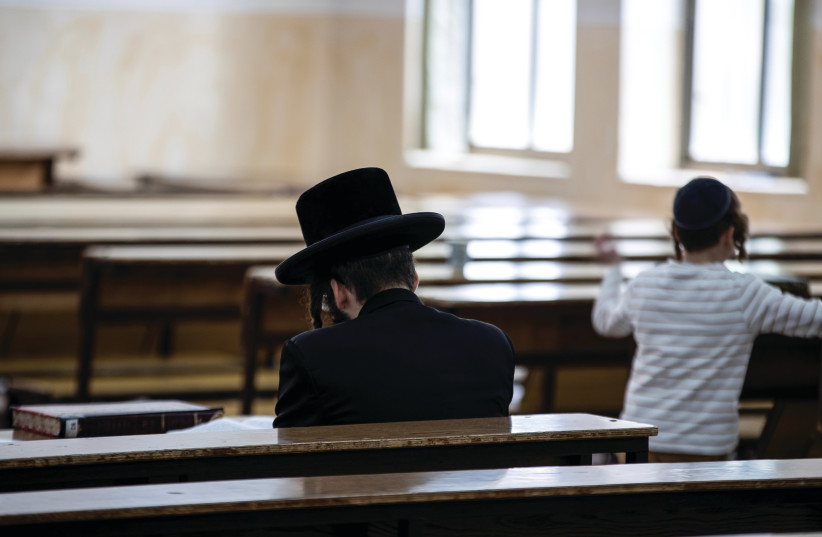The beginning of Batya Cohen’s life followed the usual trajectory. As an ultra-Orthodox woman who grew up in a home of 13 people, she got married at 18 and had three children in three years. Her marriage, though, fell apart and she divorced.
By the time Cohen enrolled in the Jerusalem College of Technology (JCT), she had developed a newfound sensitivity for those facing ostracization or marginalization from their community.
It was at this point, while studying at the Selma Jelinek School of Nursing, that Cohen discovered the College’s Lev Bakehila (“Heart in the Community”) engagement program. Lev Bakehila empowers JCT students to promote the rights of people with disabilities within the ultra-Orthodox community in Jerusalem. This resonated with Cohen.
Through the program, Cohen developed into a resource for haredim with disabilities. With time, she advocated for people with disabilities to receive the social security, housing, education, and health benefits to which they are legally entitled.
Cohen’s efforts were recognized with a prestigious award from the Council for Higher Education, but her work surpassed the accolades. She presented a game-changing paradigm for haredi student volunteers as agents of social change.
A recent study I conducted with Prof. Edith Blit-Cohen, Prof. Daphna Golan-Agnon, Maya Vardi, and Bina Be’eri, supported by the Edmond de Rothschild Foundation, examines how community engagement of volunteer students from underrepresented groups enriches marginalized community members as well as the lives of the volunteers.

Moreover, haredi students’ participation in volunteer programs offered by their colleges can result in more ultra-Orthodox community members becoming inclined to enroll in higher education.
After six years of research, our paper, published recently in the journal, Learning, Culture and Social Interaction, draws upon qualitative data from questionnaires and in-depth interviews with JCT students.
Their responses were eye-opening.
The responses
For one, we found that their volunteer experience was overwhelmingly positive, with 93.8% of haredi students reporting that their experience helping others was satisfying, enriching, informative, and meaningful. As students, it also gave them the sense of belonging and success that haredim becoming acclimated to academia crave, as many enter higher education without the proper baseline education needed to excel. Our research found that community engagement was able to serve as a link between the ultra-Orthodox and academic worlds.
THE ACT of volunteering itself coincides with one of the basic religious and cultural values practiced in the haredi community – thereby legitimizing the role of higher education in that community. In fact, many volunteers shared that they tapped into the customs and values of the haredi community for the purpose of connecting with haredim with disabilities. One of our students organized weekly Torah portion readings with a blind man, and another student attended a conference advocating for haredim with disabilities where a prominent rabbi of their community was present.
The community engagement of students establishes them as role models among ultra-Orthodox youth. Further, it demonstrates to other young haredim that higher education is a path to becoming a more knowledgeable, well-rounded, and benevolent person without sacrificing one’s values, lifestyle, or religiosity.
This experience also serves our students well, when they enter the workforce. For example, we had many nursing students share that they knew how to relate to people with disabilities because of the experience they had gained while working with Lev Bakehila.
On a macro level, JCT is uniquely positioned to cater to haredi students and offer such programming because the school’s overall philosophy is based on the idea that Torah and academic studies are not mutually exclusive. JCT students discover that higher education does not jeopardize their haredi way of life – rather it enhances it.
This volunteerism can also wake up students to the awareness that they have intrinsic value far beyond a numerical grade on a paper. It affirms that they are outstanding, committed, and productive members of both their haredi community and the academic community. These student volunteers give us hope that they will lead Israeli society to a better future.
As for Batya Cohen, she continues to be a shining example of how it is possible to simultaneously study and lead social change for good. Countless others can follow her lead.
The writer is a senior lecturer in the Selma Jelinek School of Nursing at Jerusalem College of Technology, and the co-founder and co-director of the college’s Lev Bakehila community engagement program, which he runs with Dr. Adi Finkelstein.
